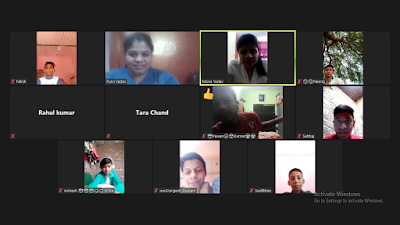“Why does child sexual abuse happen? Why do people do this?”
A very simple question
coming from curiosity and instinctive mind from an adolescent however stumped
me. I didn’t know how to answer it because can there be a logic or reasonable
explanation or any statement for an act that violates someone? I don’t think
so! The only thing that came to my mind is when the person doesn’t understand
body autonomy, that one’s body is their own business, that no one has right to
do anything without consent or the people who abuses their strength or power
does that – and thinking about why they do what they do could be a step towards
understanding or justifying the act!
Through the presentation
we talked in detail about child sexual abuse and POCSO Act 2012 and why it is
important to be aware of CSA beyond the knowledge of good touch and bad touch.
In the next part of the session, we engaged on ‘challenging child sexual abuse’.
One of the practice that we have included in the workshop this year is saying
NO out aloud. Understanding CSA is one step, but what would I do if something
like this happens to me. Saying out aloud is a major exercise where the
participants yell NO many a times till they get comfortable of saying it – this
gives them voice – a power to challenge which they have in them but are unaware
of. It is a powerful activity which changes the entire environment of the session.
One of the major aspect
of challenging CSA is recognizing trusted adult – someone who would listen to
you, understand you, will support and be there for you without judging or
shaming. It was heartening to see them pondering and coming up with the names
of father, mother, elder sister and big brother. To make them understand that
it is not the fault of the person who is at end of violence and it is okay to
seek help is very crucial.
The session was then
opened for questions –
‘Why would anyone do
this?’
‘Does it happen with
boys?’’
‘What happens when
someone calls 1098?’
Since this was the last
workshop, we also asked the participants to share their feedback –
‘I learnt a lot during
the workshop. I got to know about physical changes, private parts of boys and
girls. I didn’t even know the names’
‘I learnt about good
touch and bad touch’
‘I understood that we
shouldn’t touch someone’s private part. It is wrong and criminal offence’
‘I enjoyed the workshop
on gender – it is good to know that both girls and boys can do whatever they
want to’
‘I liked the session on
gender, understanding that we are the ones who created these difference’
‘I understood that
there are identities more than just boy and girl’
‘I learnt about sex and what does saying NO means’



No comments:
Post a Comment